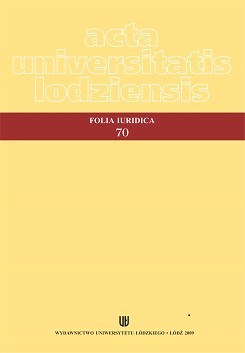The Constitution of the Republic of Poland and the Secondary European Law in the Lights of Its Superiority
DOI:
https://doi.org/10.18778/0208-6069.70.02Abstract
The Polish Constitution indicates the place of all sources of law in Polish law system, but does not precise the place of the European law, which is applied by public authorities. The Polish Constitution does not enumerate European legislative acts as a source of universally binding law. The legal status of this law is not clear according to constitutional norms. This is a reason of the discussion between the constitutionalists and the Europeanists about relations between European norms and constitutional ones. Furthermore, the problem is the lack of the system of constitutional control for the secondary European law. On the other hand the Polish Constitution forms a legal base for applying the European law, its relations with acts made by Polish authorities and it has a priority in the event of conflict with Polish legislative acts. The Constitution emphasizes the principle of its superiority (article 8, article 91, article 188) and this principle should indicate its relations with the European law. The Constitution should be treated as the most important source of law, including a system of guarantees for applying the European law in conformity to constitutional rules and with acceptation of legal principles of the European Union.
Downloads
References
Downloads
Published
How to Cite
Issue
Section
License

This work is licensed under a Creative Commons Attribution-NonCommercial-NoDerivatives 4.0 International License.














